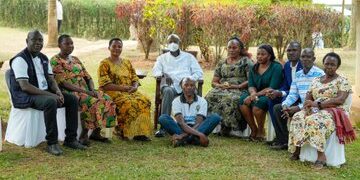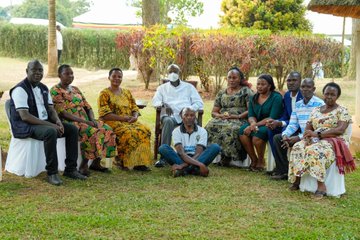President Yoweri Kaguta Museveni has unveiled a fresh national initiative to convert his demonstration farms into centres of excellence for the 4-acre agricultural model — a strategy designed to eliminate household poverty through structured, small-scale commercial farming.
Speaking on Thursday, 7th August 2025, at his State Lodge in Kityerera Parish, Mayuge District, the President said the farms will not only showcase modern agricultural practices but also distribute free farming inputs directly to interested households.
“We’re going to develop this farm according to plan and start giving you materials — coffee, pigs, chicken, or fingerlings for fish — directly,” he said.
The 4-acre model encourages diversification: 1 acre for coffee, 1 acre for food crops, 1 acre for fruits such as mangoes, pineapples, and oranges and 1 acre for pasture for livestock.
Small backyard spaces are reserved for poultry, piggery, or fish farming — especially in areas near wetlands. “These seven activities can generate enough income to lift any homestead out of poverty while creating jobs and wealth,” he emphasised.
Museveni traced his advocacy for homestead-based income back to the 1960s, when, as a student activist, he argued that poverty at household level was the real enemy — not just political control. He pointed to the transformation of the cattle corridor by 1995, where indigenous cattle were replaced with Friesians, boosting milk production and reducing dependence on imports from Kenya, New Zealand, and Australia.
The President shared inspiring success stories: Joseph Ijala, a former taxi driver in Serere District, began poultry and dairy farming on 2.5 acres in 2012. Today, he sells 310 trays of eggs daily, produces over 300 liters of milk, earns more than Shs 1 billion annually, and nets around Shs 800 million after expenses. Nyakana from Fort Portal runs a 1.2-acre poultry and dairy project, selling 120 trays of eggs daily and making Shs 130 million in annual profits, employing 15 people.
“These are people who picked just two of the seven activities. Imagine if more people embraced all seven,” Museveni remarked.
The President said the Kityerera farm would become a zonal center of excellence, showcasing all seven activities. He discouraged rice growing in wetlands, urging farmers to adopt fish farming instead, noting it can yield Shs 66 million per acre with eight ponds — more profitable and environmentally friendly than rice.
He cited scientific advances such as Prof. Florence Muranga’s 53-ton matooke harvest per acre, compared to the usual 5 tons, as proof of the potential in better farming methods.
To help farmers adopt the model, Museveni encouraged the formation of SACCOs for financial access and pledged direct provision of inputs, especially for livestock and fish farming, as seen in the Limoto Rice Scheme.
The President also addressed concerns about livestock theft, promising to strengthen sub-county policing with 18 officers each, police dogs, surveillance cameras, and the capacity to track criminals even if they flee in vehicles.
He further commended the people of Busoga for their role in the liberation struggle, recalling heroes like James Mbigit, William Nkoko, Rashid Ntale, and Sam Kasadha, who were killed under Idi Amin.
The event was attended by senior government leaders, including Third Deputy Prime Minister Rt. Hon. Rukia Nakadama Isanga and Minister for the Presidency Hon. Babirye Milly Babalanda. Nakadama thanked Museveni for his commitment to Kityerera, saying, “You told us you don’t want poor neighbors, and that’s why you’ve brought us here.”
Local leader Janet Nkoko and residents requested agricultural and financial support — a request to which the President responded positively.











